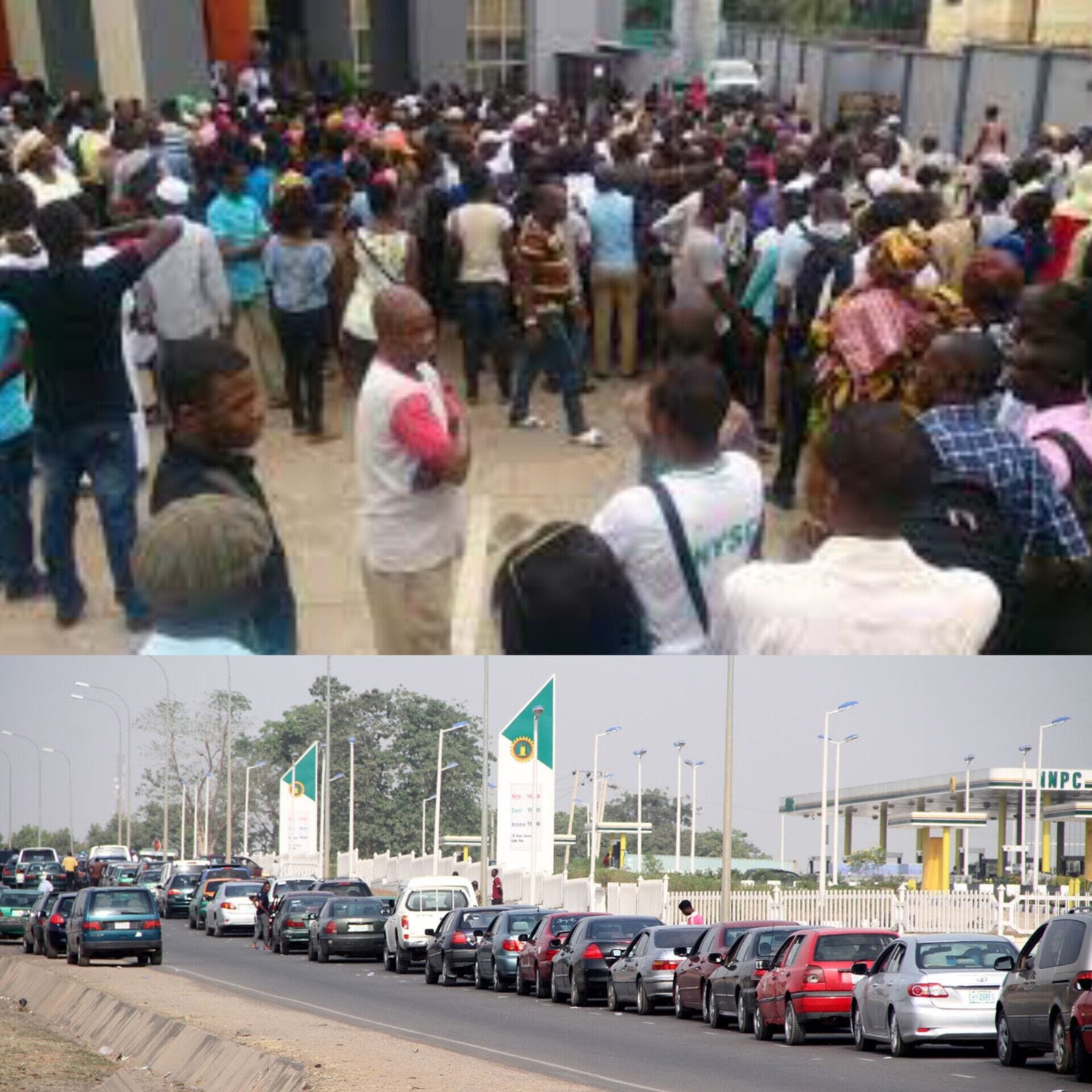[ad_1]
By Sarah NEGEDU, Godfrey AKON & Laraba MUREY
The ongoing fuel scarcity experienced in parts of the country is further contributing to the sprawling queues witnessed across various sectors of the economy.
Citizens are forced to join long queues in banks to access cash, and also join similar queues at Point of Sales, POS, outlets at fuel stations to pay for the scarce products.
Anywhere you turn to in Nigeria of recent, it is one queue or the other. At fuel stations Nigerians queue to pay for fuel, then queue to be dispensed to.
In the hospitals, Nigerians queue to see doctors because the country faces an acute shortage of doctors as the medical sector faces serious hemorrhage as medical personnel leave in droves.
It is estimated that over 7, 000 Nigerian doctors have left the country in the past eight years.
Also, at markets, Nigerians can be found in queues as they battle to use PoS that are either epileptic or not available.
Not too long on February 26, Nigerians braved the odds to queue for long hours at polling units for an election fraught with irregularities and controversies.
The Nigerian National Petroleum Company Limited, NNPCL, had assured Nigerians of adequate supply of Petroleum Motor Spirit, PMS, also known as petrol for the next 47 days, covering the entire month of March and beyond.
The company said, in a statement by its Chief Corporate Communications Officer, Garba-Deen Muhammad, that latest updates released last Saturday showed a total of 2.1 billion litres of PMS stock, representing 0.9 billion litres in all the land depots nationwide and 1.2 billion litres on marine vessels, which is equivalent to 35 days sufficiency as of 4th March 2023.
“We plan to close the month of March 2023 with about 2.8 billion litres, which is equivalent to 47 days of sufficiency,” NNPCL said.
The company explained that the appearance of pockets of queues in Abuja and some parts of the country, is largely due to restrictions in businesses and movement, to allow for the conduct of the Presidential and National Assembly elections and enable Nigerians to exercise their civic right.
It, however, noted that operations have now resumed at the depots and trucks are being dispatched to various parts of the country.
“We expect normalcy to be restored in the next few days. NNPC Ltd. and all its partners and stakeholders will continue to work together to ensure seamless distribution of petroleum products around the Gubernatorial and State Assembly elections. We, therefore, enjoin Nigerians not to engage in panic buying,” it said.
Reacting to the long queues sprawling across the country, some residents of the Federal Capital Territory who spoke with our correspondent believe the numerous queues will have a rippling effect on the economy.
For instance, Dr. Kingsley Osagie, a medical practitioner in Abuja, said the long queues are taking out of the productive hours of the citizens could have used to contribute meaningfully to themselves and their organisations.
In his words, “The queues are many, I believe it is eating into the time, the productive time people should have used to develop the economy. A lot of workers spend hours in either banks to get the elusive new Naira notes and they can’t even get it. They go to the fueling station and they have to queue and of course each hour they spend there we are paying for it. The economy pays for it because this is the man hour that you could have used to develop the economy and of course the nation by extension that is spent waiting for fuel. And whilst there, there are a lot of fights coming up, and an avenue to spread all kinds of diseases, people are coughing and spreading all sorts of respiratory tract diseases.
“If you look at it critically, then indirectly the nation can also be said to be paying through healthcare delivery, because that will put pressure on the health care system.
“So it is really something that is very concerning, because we believe that by now, such queues should have disappeared. We’re very hopeful, now of course with the election another queue for vote. We are in the queuing season. So, at the end of the day, Nigerians really get irritated because after queuing for this and that so stayed for the whole day, and nothing, it’s impacting on the psychological wellbeing of the masses. I believe the government should look into it. Start one step at a time to resolve issues.”
Also, Mr. Diamond Raphael, a businessman who runs his business at the Garki International Market, the trend of long queues across the country has affected businesses negatively.
“The queues all round has affected my business, in fact it has grounded it. We are experiencing low patronage, increased cost of transportation, thereby increasing the cost of goods. Also the cashless policy has affected my business, people don’t have cash to pay for goods and bank transfers are not going as well so the whole thus is frustrating.
“The fuel queues also makes it difficult to reach my place of business because I spend long hours queuing to pay for petrol via POS and then join a separate queue to buy the fuel. So at the end, instead of being at my shop by 8:00am, I sometimes open in the afternoon because I spend the whole morning looking to buy fuel to power my generator as there is no light.”
[ad_2]
Source link



